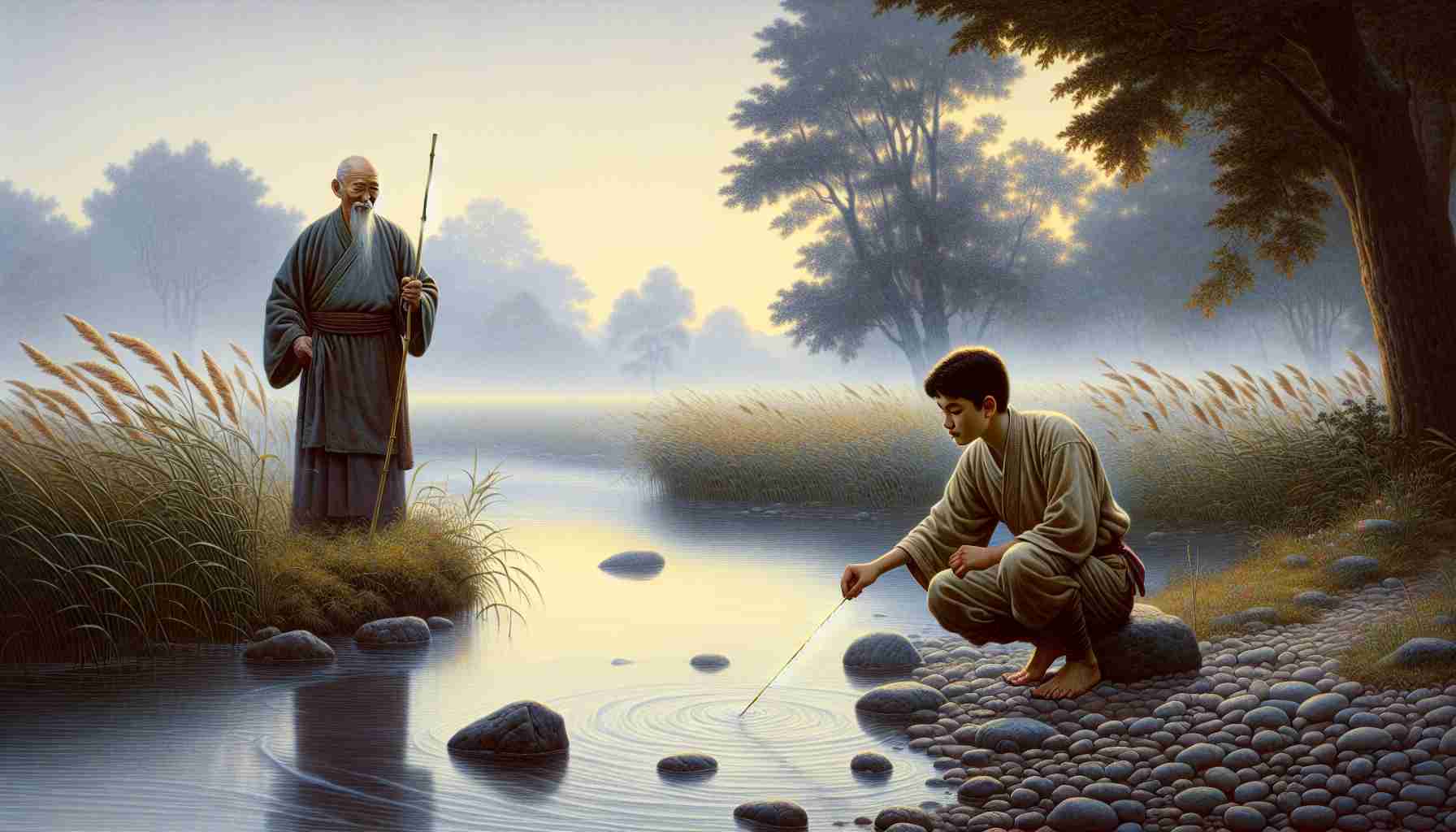

The wind was strong that morning, tugging at my sleeves and whispering through the grass. I knelt beside the riverbank, gripping a stick so tightly my hand had turned red. I had worked hard for days—trying to stack stones just the right way to build a small dam. But no matter how I did it, the water found its way around. I was thirteen years old and very sure that if I just tried harder, I could control the river.
My grandfather watched from a distance, quiet as always. His name was Wei Shen, and people in the village called him “the Wind-Wise Elder.” He had no titles, owned little, and spent most of his days tending the garden or carving wooden whistles. But everyone—young or old—listened when he spoke.
Grumbling, I slammed another stone into place and shouted, “Why won’t it stay? I’m doing everything I can!”
Grandfather stood and walked over, step by slow step. He didn’t look frustrated. He didn’t look rushed. He just smiled softly and sat down beside me.
“Tell me,” he said, his voice like falling leaves, “why does the river flow?”
“I don’t know,” I huffed. “Because it does?”
He nodded gently. “Exactly. It simply flows, not pushing, not planning.”
I wrinkled my nose. “But I’m trying to build something strong. Doesn’t that matter?”
“Let me show you something,” he said, pointing to a blade of grass swaying near the river's edge. “That grass bends with the wind. It does not fight it, but it does not fall. Now look at those tall reeds standing stiff.”
A strong gust blew past, and the rigid reeds snapped. The soft grass only bowed, then stood tall again.
“They worked harder,” I said, thinking of the reeds. “But they broke.”
“Sometimes effort brings strength,” Grandfather said, “but sometimes—not acting is the strongest action.”
I didn’t really understand, but I stayed quiet. That night, I lay in bed listening to the wind outside. It sounded like singing—soft, steady, never stopping. Yet, it never tried to shout.
The next day, by the river, I did something new. I let go of the stones. I sat and watched the water move, twisting around rocks, flowing over and under, never stuck, never still. I realized the river didn’t need to be dammed—not by me, not with force. Instead, I started using the current itself to help shape the banks. I let it show me the way.
Weeks passed, and something changed in me—not all at once, but bit by bit. I worked less with force, and more with flow.
Grandfather smiled when he saw me. “Ah,” he said, “now you walk with the Tao.”
I didn’t change overnight. But now, whenever I grow angry or try too hard to control things, I remember the soft grass. I remember the river that never fights, yet always moves forward.
And I breathe. I let go. I let it flow.
The wind was strong that morning, tugging at my sleeves and whispering through the grass. I knelt beside the riverbank, gripping a stick so tightly my hand had turned red. I had worked hard for days—trying to stack stones just the right way to build a small dam. But no matter how I did it, the water found its way around. I was thirteen years old and very sure that if I just tried harder, I could control the river.
My grandfather watched from a distance, quiet as always. His name was Wei Shen, and people in the village called him “the Wind-Wise Elder.” He had no titles, owned little, and spent most of his days tending the garden or carving wooden whistles. But everyone—young or old—listened when he spoke.
Grumbling, I slammed another stone into place and shouted, “Why won’t it stay? I’m doing everything I can!”
Grandfather stood and walked over, step by slow step. He didn’t look frustrated. He didn’t look rushed. He just smiled softly and sat down beside me.
“Tell me,” he said, his voice like falling leaves, “why does the river flow?”
“I don’t know,” I huffed. “Because it does?”
He nodded gently. “Exactly. It simply flows, not pushing, not planning.”
I wrinkled my nose. “But I’m trying to build something strong. Doesn’t that matter?”
“Let me show you something,” he said, pointing to a blade of grass swaying near the river's edge. “That grass bends with the wind. It does not fight it, but it does not fall. Now look at those tall reeds standing stiff.”
A strong gust blew past, and the rigid reeds snapped. The soft grass only bowed, then stood tall again.
“They worked harder,” I said, thinking of the reeds. “But they broke.”
“Sometimes effort brings strength,” Grandfather said, “but sometimes—not acting is the strongest action.”
I didn’t really understand, but I stayed quiet. That night, I lay in bed listening to the wind outside. It sounded like singing—soft, steady, never stopping. Yet, it never tried to shout.
The next day, by the river, I did something new. I let go of the stones. I sat and watched the water move, twisting around rocks, flowing over and under, never stuck, never still. I realized the river didn’t need to be dammed—not by me, not with force. Instead, I started using the current itself to help shape the banks. I let it show me the way.
Weeks passed, and something changed in me—not all at once, but bit by bit. I worked less with force, and more with flow.
Grandfather smiled when he saw me. “Ah,” he said, “now you walk with the Tao.”
I didn’t change overnight. But now, whenever I grow angry or try too hard to control things, I remember the soft grass. I remember the river that never fights, yet always moves forward.
And I breathe. I let go. I let it flow.